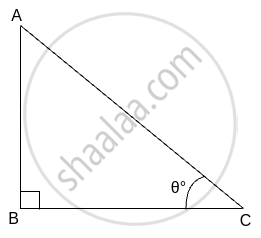Advertisements
Advertisements
Question
Prove that `(sin θ tan θ)/(1 - cos θ) = 1 + sec θ.`
Solution
LHS = `( sin θ tan θ)/(1 - cos θ)`
= `(sin θ. (sin θ)/(cos θ))/(1 - cos θ)`
= `sin^2 θ/(cos θ( 1 - cos θ))`
= `((1 - cos θ)(1 + cos θ))/(cos θ(1 - cos θ))`
= `(1 + cos θ)/(cos θ) = 1/(cos θ) + cos θ/cos θ`
= sec θ + 1
= RHS
Hence proved.
APPEARS IN
RELATED QUESTIONS
If `sec alpha=2/sqrt3` , then find the value of `(1-cosecalpha)/(1+cosecalpha)` where α is in IV quadrant.
Prove the following trigonometric identities.
`(cos^2 theta)/sin theta - cosec theta + sin theta = 0`
Prove the following identities:
sec2 A . cosec2 A = tan2 A + cot2 A + 2
Prove the following identity :
`(1 - sin^2θ)sec^2θ = 1`
Prove the following identity :
`(secA - 1)/(secA + 1) = (1 - cosA)/(1 + cosA)`
Prove the following identities: cot θ - tan θ = `(2 cos^2 θ - 1)/(sin θ cos θ)`.
If sin θ + cos θ = a and sec θ + cosec θ = b , then the value of b(a2 – 1) is equal to
Show that tan4θ + tan2θ = sec4θ – sec2θ.
Prove the following that:
`tan^3θ/(1 + tan^2θ) + cot^3θ/(1 + cot^2θ)` = secθ cosecθ – 2 sinθ cosθ
Find the value of sin2θ + cos2θ

Solution:
In Δ ABC, ∠ABC = 90°, ∠C = θ°
AB2 + BC2 = `square` .....(Pythagoras theorem)
Divide both sides by AC2
`"AB"^2/"AC"^2 + "BC"^2/"AC"^2 = "AC"^2/"AC"^2`
∴ `("AB"^2/"AC"^2) + ("BC"^2/"AC"^2) = 1`
But `"AB"/"AC" = square and "BC"/"AC" = square`
∴ `sin^2 theta + cos^2 theta = square`
